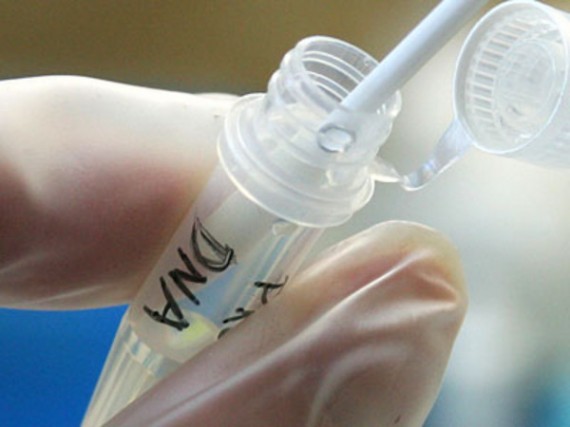Are There Limits To DNA Testing By the State?
The state of Mississippi is going to use DNA evidence to track down statutory rapists. Why not deadbeat dads?
While I’m inclined to side with the dissenters in yesterday’s Supreme Court ruling allowing suspicionless DNA taking from anyone arrested, I don’t feel particularly strongly about it. It strikes me that the infringement on liberty is incidental–surely, less so than the arrest itself. To the extent it helps investigators find guilty people and eliminates the innocent from suspicion, that’s all to the good.
I’m actually surprised we don’t collect DNA samples at birth, school enrollment, drivers license issue, and various other times when citizens interact with the state in order to build a national database given the value it would have in not only criminal investigation but such things as identifying kidnapped children, allowing adopted children to investigate their family health background, and the like. I’m hard pressed to conjure a civil liberties argument against it.
The state of Mississippi is going to use DNA evidence to track down statutory rapists.
Starting in July, doctors and midwives in the state will be required by law to collect samples of umbilical cord blood from babies born to some girls under the age of 16. Officials will analyze the samples and try to identify the fathers through matches in the state’s DNA database.
“It is our hope that we can deter men over the age of 21 from having sex, particularly with girls 16 years and younger, particularly if they know we are going to pursue them,” said Jim Hood, the state’s Democratic attorney general who helped draft the bill.
Officials said Mississippi is the first state in the country to try the approach.
Gov. Phil Bryant, a Republican, is also a supporter of the effort. Previously a deputy sheriff, Bryant said it’s necessary to protect young women who might be victimized by older men, even if the teenagers say they consented to having sex. Too many of these young teens are becoming pregnant against their will, he said.
Now, I’m queasy about Mississippi’s statutory rape law itself, which makes an 18-year-old having consensual sex with his 16-year-old girlfriend a felon. It’s pretty common for teenage boys to date girls a couple years younger. Still, that’s the state of the law and it makes perfect sense to seek to enforce it through available information technology.
Some in the medical community are protesting that they are effectively being deputized into law enforcement. But that strikes me as silly; we make licensed professionals comply with all manner of civic requirements in order to practice. And this is far less intrusive than, for example, requirements to report suspicions of child abuse to the authorities.
Still, I wonder how far this goes. Statutory rape leading to pregnancy is statistically a small problem:
While Mississippi’s teen pregnancy rate is about 60 percent above the national average, it is near a 40-year low. Of the 6,100 births to teenagers in 2012, 111 were babies born to girls under the age of 15.
Roughly 65 percent of teenage pregnancies in the state occur between teens who are one or two years apart in age.
So, 111 cases in Mississippi, 72 of which are the sort of technical violations of the statutory rape laws that many of us think shouldn’t be illegal. But why couldn’t the same evidence be used to track down deadbeat dads to collect child support payments that might keep the mother and child off the welfare rolls?







Yeah, I can’t think of anything that could possibly go wrong with the government having a massive database of the most personal information it could possibly collect from everyone in the country. Nothing at all.
Yesterday I learned that cameras in police cars routinely identify the license plates they see, and stamp them with time and location. This means that should a driver become a suspect, this location history can be dredged. We also have more public surveillance cameras, with improving facial recognition.
It seems like the DNA is just a component of a much wider “big data state” issue.
And if we aren’t going to restrict big data, it makes no sense to me to restrict DNA tracking.
My DNA is what it is. It’s never been collected, but then neither have my mug shots or full set of finger prints. The state does have my “DMV subset” of one old photo and one thumbprint.
Should I really care?
BTW James, I think that on the Mississippi thing that what you really want is appropriate responses to the situation and/or crime, rather than “don’t tell me because I don’t want to know.”
@john personna:
It is, but at the same time, it’s different. DNA isn’t something you do (drive around on the roads), it’s not even a picture of you (that will change over time). DNA is what you ARE. And we’re just beginning to scratch the surface of what that means.
The technology is about 1000 miles ahead of the ethics and the government is all too willing to exploit the gap.
What @Mikey said. The problem is not so much the state taking & using DNA samples in the course of an investigation; the problem is what happens to the information after that. If you’ve got access to someone’s fingerprints in a database, there’s not much you can really do with that. But a database of random uncharged citizens’ DNA is fundamentally different. That information can be used for many, many purposes – legitimate and illegitimate; reasonable and unreasonable’ harmless and life-affecting. And there is no chance whatsoever that some state – most likely a cash-strapped, “business-friendly”, fairly corrupt state… say, a GOP-run southern state just like Mississippi – won’t consider selling that data to the highest bidder.
@Mikey:
That’s why I put the facial recognition in there.
Over 300,000 people passed through the face recognition system in the Bratislava stadium in 14 days
@legion:
As I understand it full sequence DNA tests are still very time consuming (and expensive). I can’t believe that at any point law enforcement would waste effort on such a thing. They don’t care. They have no internal reward system that would make them care.
All they want are answers on a few critical identification points.
And you know, a swab in a bag is not a full sequence DNA test either.
Related:
Exaggerated claims from genetic ancestry testing companies undermine serious research into human genetic history
The story is that “ancestry” companies also just test on a few DNA sequences and then claim a deeper scan.
@Mikey: @legion: Oh, I have no doubt that the information could be abused. But that doesn’t necessarily mean they shouldn’t have it. The IRS has all sorts of information about me that can be abused but it’s necessary in order to administer our ridiculously complex tax code. The answer to abuse is oversight and stiff penalties for violators.
It strikes me that the stated use of DNA evidence for identification purposes, while certainly an expansion of the State’s search and seizure powers, is fairly innocuous and quite similar to fingerprints, as the Supreme Court just ruled. My problem comes from the fact that this information can be used for much more invasive purposes than just identification. Not only could personal health information be gleaned, at some point, couldn’t science get to the point that citizens be considered pre-disposed to “violence” or “untrustworthiness” due to a certain genetic signatures? Wouldn’t the State feel compelled to treat these citizens differently, through surveillance or otherwise? I don’t consider myself part of the “tinfoil hat” crowd, but this type of information gathering really sets off my Big Brother alarm.
One supposes that Mr. Hood misspoke, but it is Mississippi, so who knows.
More:
Some of you may not have been aware of the difference between a police “match” and a full sequence, but right now it’s pretty big.
Let’s say it dropped by another factor of 10 from $10,000 to $1000, and the police test did as well, from something like $100 to $10.
How many police departments are going to pay $1000 for every arrest when $10 is all they need?
@James Joyner:
See my links. The police departments do not have this information and are unlikely to … ever.
But if you really want to draw a line, set the legal bar at an identity level DNA scan and just block police from full genomes sequences.
Now this scares me. Rights to the information encoded in your DNA? I can imagine what could happen to that.
@Scott:
Kinda sad. Like that woman (long dead) whose cancer cells have been used for decades of research.
But you know, if you were in bed with a dread disease would you really try to negotiate a payout for a scan?
Not me, I’d half consider it a hail-Mary for my own cure, and half consider it my endowment for research.
Call me cynical , but I think the Mississippi law is all about protecting the fair flower of young white womanhood from being besmirched by Negro boys.
The Maryland law seems rather benign to me,although I would also be OK with a warrant requirement. I think the slippery slope arguments are lazy and sophistical.
What is needed here is much more legislative attention to the whole issue of the uses of DNA. The DNA revolution is here folks. Legislators need to work on these important issues , not just pass meaningless attempts to abolish Obamacare.
@James Joyner:
I don’t think the IRS is a particularly good example if you’re looking to support any assertion of government restraint at the moment.
On one hand…DNA Identification is the present and the future…there’s no avoiding it and I’m certain this ruling is correct.
On the other hand, and I think this is separate from the ruling, any number of potentially Kafka-esque scenarios based on alledgedly incontrovertible evidence can be imagined.
Oversight and stiff penalties, as James points out, are key.
Counter to James’ admitted political party preferences…oversight doesn’t exist in a world run on austerity budgets. Cutting 20% of the federal governments discretionary budget doesn’t lead to appropriate oversight.
Perhaps the 38th vote to repeal Obamacare will provide an answer to the dilemma.
@ Mikey…
Seriously?
A few low-level folks in a bureaucracy of around 90,000 f’ed up…about one tenth of one percent if you want to believe even the most ridiculous claims of the right wing nuts…and even then they didn’t actually limit or in any way hamper the activities of anyone.
If government restraint on a massive DNA database is that effective…we are good.
My only fear is that it won’t be.
@Mikey:
And, just as importantly, DNA is also a picture of what you will BECOME. DNA will start to reveal the diseases we are likely to develop, the age we can expect to live to, etc. etc.
@john personna:
I wasn’t aware of the huge difference between identification and full genome sequencing. As long as it is limited to ID only, I agree with the Court’s decision.
@Sam Malone: I don’t believe the most ridiculous claims of the right wing nuts, but at the same time, I think you’d have to be quite naive to think there the organization that exists specifically to collect taxes doesn’t have some level of institutional bias against anti-tax conservatives. Wouldn’t you feel some animus against people who are basically calling for your organization to be abolished and for you to be made jobless?
Still, you have a good point–while the IRS is far from perfect, it seems to handle the amount of personal information it holds on Americans pretty well.
@john personna: I’d wager the full sequence will be under $100 within 20 years. You can already get a PCR thermocycler for $599.
That’s not really my point, though–as I said above, ethics (and I’d add, law) are 1000 miles behind the technology, and government is all too willing to exploit the gap.
It’s possible, of course, to enact strong protective legislation, but I am not optimistic, especially when the Supreme Court decides it has no problem with the authorities gathering DNA from people and sticking it in a database forever.
@ Mikey…
I suppose if I worked at the IRS I would think the same thing about Tea Partiers that I do now…useless unproductive idiots.
Given that they have held 37 votes to abolish Obamacare and it’s going nowhere….and they haven’t held any votes on the IRS…I’d feel safe from the idiots.
@Mikey:
I’m not sure I follow. You suggest $100 dollar tests in 20 years, which is quite a long way away. And then you claim that “ethics (and I’d add, law) are 1000 miles behind the technology.”
Didn’t you really just say that we have time to sort it out?
Full sequencing is very expensive now. As we’ve seen, only 30K people have had it, and there were legal releases involved.
[According to this page the OpenPCR can do “barcode” level sequencing.]
@john personna:
Probably so.
And hopefully so.